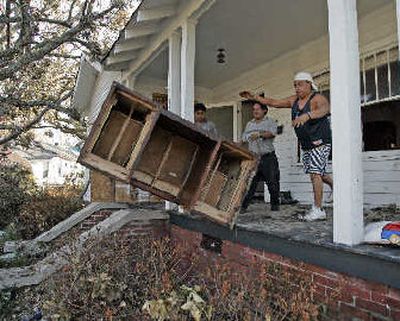Cost of Katrina is mounting

WASHINGTON — The economic hit from Hurricane Katrina keeps growing, with experts now saying it’s likely to top $100 billion and could go much higher.
And while the epicenter of the damage is on the Gulf Coast, consumers around the country — already dealing with record-high gas prices — also may end up paying more for everything from lumber to coffee because of disruptions wrought by the storm.
The government has yet to put an overall price tag on Katrina, but there is general agreement the hurricane will be the most expensive natural disaster in U.S. history.
Paul Getman, chief executive officer of Economy.com, estimates the economic loss from the hurricane that devastated New Orleans and a swath of communities along the Gulf Coast will total around $175 billion.
Most of that — $100 billion — is damage to homes, businesses, roads, bridges, levees, telecommunications, water and sewer systems and other public infrastructure, he said. Another $25 billion is the cost of disrupted economic activity. Larger energy bills faced by consumers and businesses make up the other $50 billion.
Risk Management Solutions of Newark, Calif., which specializes in estimating potential losses from natural disasters and terrorist attacks, estimates the economic loss from Katrina could exceed $100 billion in terms of property and infrastructure damage and business interruptions, marketing director Shannon McKay said.
Fallout from the hurricane will slow economic activity for the country as a whole in the months ahead anywhere from one-half percentage point to a full percentage point, economists said. That’s because elevated prices for energy and other goods are expected to damp spending by consumers and investment and hiring by businesses, analysts said.
The storm’s economic impact is being felt by consumers and businesses around the country because the Gulf Coast region is an essential hub for oil and gas production and distribution. The area also is home to vital shipping and transportation links that allow grain and other goods to flow out of the country and coffee and other cargo to flow in.
Oil facilities were knocked out. Ports, roads and railways were crippled. Businesses were shut down.
For consumers, the fallout means higher prices not only for gasoline, which has soared over $3 a gallon, but potentially for a variety of other goods as well, analysts said.
“Consumers are likely to pay more for lumber, coffee, chocolate, perhaps sugar — anything that we import through the ports in the affected region will face higher prices,” said Mark Zandi, chief economist at Economy.com.
More expensive fuel costs to transport all kinds of goods also are likely to show up in higher prices charged to consumers. “Almost every good that sits on store shelves might see an increase in price related to Katrina,” Zandi predicted.